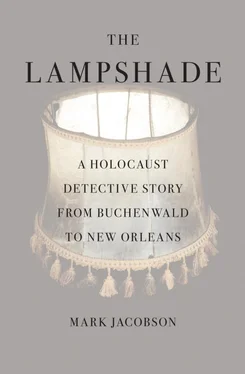Mark Jacobson
THE LAMPSHADE
A HOLOCAUST DETECTIVE STORY FROM BUCHENWALD TO NEW ORLEANS
And after my skin has been destroyed, yet in my flesh I will see God.
Job 19:26

PROLOGUE

I must say I didn’t put much stock in the possibility that a Dominican spiritualist working out of a basement in Union City, New Jersey, would have much to say about a human skin lampshade reputedly made in a Nazi concentration camp. But there I was sitting across from Doña Argentina, a large woman wearing a ceremonial headdress and smoking a pair of cigars, one on either side of her mouth. A friend of mine, a devotee, had recommended the medium, saying that if the lampshade had truly once been part of a person, “the spirit” would still be present. If so, then Doña Argentina would make contact with it, bring its secrets to light.
There was a bit of desperation in my visit, an anxiety that had been mounting since I had first come into possession of the lampshade, which a friend had purchased at a rummage sale in New Orleans, Louisiana, in the aftermath of Hurricane Katrina. Later, after DNA testing proved that the lampshade had been fashioned from the skin of a human being, I’d spent many, many months attempting to track down its true nature, its origin and meaning, a search that had taken me halfway around the world. So I was willing, if not too excited, to drive the ten miles from my Brooklyn home, through the Lincoln Tunnel, to Union City, where everyone speaks Spanish, to hear what the mystic had to say.
Doña Argentina, who said she had learned the ways of contacting the dead from her mother, whose portrait could be seen on the wall behind a six-foot-tall plaster of Paris likeness of the Virgin, began the session auspiciously. Taking the lampshade from its box, she took one look and said, “Oh, they kill him.” This was quite possibly accurate, considering there was every chance the shade had been constructed from the skin of one of the eleven million people, six million Jews among them, who had been killed by the Nazis during their twelve-year reign of terror. On the other hand, spiritualists had their tricks. They like to impress their needy supplicants. I did not know what my friend had told Doña Argentina about the lampshade before I’d arrived.
A few moments later, Doña Argentina placed a candle beside the lampshade, which was alarming. After making a number of trips to Buchenwald, the Nazi camp most associated with the lampshade story, and spending much time in New Orleans, where the object had been scavenged from an abandoned building wrecked in the catastrophic hurricane, I had no desire to see it incinerated in the basement of a Jersey spiritualist’s parlor. This seemed a real possibility as the candle flame grew higher.
“ Mira! The spirit is strong,” Doña Argentina said, taking a chug of rum. “It is speaking…” There was a pause now, as she stiffened in her velveteen chair. Her eyelids were fluttering. “He says… he says…”
I’d always assumed the skin of the lampshade came from a male, but this was the first time I’d heard it identified by the pronoun. Until this moment it had always been an it, a frightening, intentionally depersonalized it .
“He says… they are all bad to him. They hurt him. They cut him. Stab him with knives. They throw him in the closet. Lock him away. But you… you are different. You are kind to him. You give him attention.”
“Yes.” I was paying attention to the lampshade. For months I’d thought of little else.
The candle flame shot higher. Doña Argentina swigged more rum. The picture of her mother loomed above. “He says he feels safe with you. He wants to stay with you.”
“Stay with me?”
“He says he wants to stay with you always. He never wants to leave you.”
“You’re kidding.” Ever since the lampshade had arrived at my door as an unsolicited parcel of terror, I’d been trying to get rid of it. It was, I thought, like the black spot in Robert Louis Stevenson’s Treasure Island, a dark circle inscribed on a page ripped from a purloined Bible, a floating accusation of ultimate guilt a pirate might find shoved in his breeches some bad night. The idea was to divest yourself of the spot before its curse took hold, to pass it to the next unsuspecting fool, if need be.
“He can’t stay with me. That’s crazy.”
Doña Argentina leveled her gaze at me. For the moment it seemed as if she’d separated herself from her trance and had returned to the temporal world. She lowered her voice, as if to keep her thoughts from the spirit.
“Por qué?” she asked. “ Por qué he can’t stay with you?”
“Because… because it is a Nazi lampshade. It doesn’t belong to me. I can’t keep a Nazi lampshade.”
“You don’t want him? He is not a Nazi.”
“I know he’s not a Nazi. I know that.” Doña Argentina was recommending I keep the lampshade near me as much as possible, to keep it at my bedside. “I can’t have a Nazi lampshade in my house.”
“But this is what he wants. You cannot do it? You want me to tell him that he cannot stay with you. That you don’t want him.”
“It isn’t that I don’t want him. I just can’t… keep him.”
Suddenly this trip to Union City had become very complicated. I couldn’t become the permanent guardian of a human skin lampshade. It—or should I now be referring to the shade as he?—was a dead person. A murder victim, a former human being, not a curio, a grim collector’s item. I’d spoken to rabbis, to museum officials, professors, geneticists, policemen, politicians. Dozens of serious people had weighed in with opinions concerning the lampshade and what should be done with it. Now this spiritualist, this lottery number picker, was advocating this radical course of action.
“I will tell him,” Doña Argentina said, in the manner of a neutral messenger. The candle flame shot higher again. Doña Argentina stared into the fire. She let out a barking sound. If it was a performance, it was a good one. It was a while before she spoke again.
“He says there is nothing he can do. It is your choice. He says he leaves his fate to you… but it is good.”
“Good?” I replied meekly.
“It is good because he trusts you. You’re the only one he has now.”

ONE

In the fall of 1827, as he was completing his masterwork Faust, Johann Wolfgang Goethe, greatest of all German writers, took a walk through the Ettersberg forest near his home in Weimar. “This is a good place to be,” the seventy-eight-year-old Goethe told his secretary and biographer, Johann Peter Eckermann, as the two men paused to admire the view. “Of late I have thought it would be the last time I should look down from here on the kingdoms of the world, and their splendor. We tend to shrink in domestic confinement. Yet, here we feel great and free… as we always ought to be.” [1] The story of selling one’s soul to the devil for temporal reward has long been among the most reliable narratives in world culture, but for Goethe and his German readers it was essentially a local story, with its roots quite close to the Ettersberg forest.
Читать дальше














